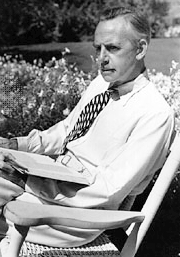On this date in 1888, Eugene O’Neill was born in New York City in a hotel on Broadway, the third son of popular actor James O’Neill. As a youngster he traveled with his father, then was sent to a Catholic boarding school. O’Neill entered Princeton in 1906. After he was expelled he set off on adventures prospecting for gold in Honduras, working as a sailor and a variety of other jobs. While recovering from a bout of tuberculosis, O’Neill, influenced by his reading of Ibsen and other dramatists, determined to become a playwright.
He won the Nobel Prize for Literature in 1936 and four Pulitzer Prizes for Beyond the Horizon (1920), Anna Christie (1922), Strange Interlude (1928) and Long Day’s Journey into Night, written in 1939 but awarded posthumously in 1957. Some of his other works include Mourning Becomes Electra (1931), Ah, Wilderness! (1933), The Iceman Cometh (1936) and A Moon for the Misbegotten (1943).
O’Neill had three wives and three children before dying at age 65 in 1953 after years of poor health exacerbated by alcoholism. He died in Room 401 in the Sheraton Hotel in Boston. According to biographer Louis Scheaffer, his whispered last words were “I knew it. I knew it. Born in a goddamn hotel room and dying in a hotel room.”

